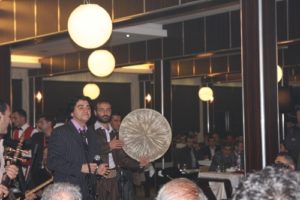Prepared by Amir Sharifi and Luqman Barwari, 14/01/2011
As 2010 was coming to an end, one could make a forceful argument that the year was an intriguing and fruitful one when it came to the long neglected Kurdish language, art, and literature. Kurdish intellectuals, politicians, and activists in the homeland and Diaspora for the first time discussed their shared interests and aspirations to ensure that they re-discover, reassert and regain their role in studying, safeguarding, and representing their cultural legacy and ethnic and linguistic identity.
From Dec 11 to Dec 12, 2010, many well known Kurdish intellectuals, artists, and performers met in one of the cultural capitals of Kurdistan, Diayarbakir or Amed, an old city on the plains of Tigris River to discuss Kurdish history, both ancient and contemporary, the current situation, and future directions and perspectives on the Kurdish culture. This was the first Kurdish Culture, Literature and Art Conference organized by the Democratic Society Congress (DTK), Mesopotamia Cultural Centers (MKM) and Diyarbakir Municipality. This pioneering initiative had received the support of Kurdish politicians, activists, intellectuals and artists from different parts of the land. The conference organizers deserve congratulations for two days of stimulating and inspiring talks on the issues that the Kurdish nation faces in these difficult but promising times. Indeed, the conference promoters deserve the immense success that their conference enjoyed. For the conferees it was a great joy and privilege to have met many fellow Kurds from different parts of our land. Kurds from Western, Southern, Northern, Central and Eastern Kurdistan had converged on Amed as had Kurds in Diaspora: from Russia, European countries, and the U.S. Some participants, particularly women organizers were dressed in the brightly colorful Kurdish dresses, giving the event a festive mood, accentuated by podium sized floral designs made of colorful fabric, emblematic of the Kurdish flag. The stage in the Gegerxwin Cultural Hall was decorated with iconic images of Kurdish prominent literary and historical figures such as Ahmad Khani, Baba Tahir e Oryan, Malaye Jaziri, Hemin, Fatma Isa, Musa Anter, Cegerxwin, Osman Sebri, Aysha Shan, Ibrahim Ahmad, Hejar, and Qanate Kurdo on a backdrop. The organizers were very earthbound, offering their guests; more than 250 delegates the legendary Kurdish hospitality. To facilitate communication among speakers of different dialects of Kurdish and non-Kurdish speakers, simultaneous interpretations were provided in Sorani, Kurmanji, English, and Turkish. Through the efforts of the organizers, scores of well known participants from different domains of knowledge and academic disciplines exchanged ideas and debated their perspectives on a variety of topics. Community leaders and associations such as The Kurdish Institute in Istanbul, Mesopotamia Cultural Centers were represented. Browsing through the program schedule, one could see many prominent figures such as Ozkan Kuchuk, Kurdologist, Jalile Jalil, Kurdologist, historian, and writer., Hashem Ahmadzadeh, author and director of Kurdish studies Sami Tan, the Director of Kurdish Institute in Istanbul, Mikail Aslan, composer and musician, and Mushin Osman, film director.
The conference organizers had also brought together a great many Kurdish politicians and parliamentarians and officials such as Ahmet Turk, co-president of the Peace and Democracy Party, Osman Baydemir, the mayor of Diayarbakir. A delegation from the Kurdish Regional Government (KRG) was also present throughout the conference as there were several panelists from KRG. As noted by the organizers “For the first time in the history of our people, Kurdish intellectuals, writers and artists had the opportunity to discuss the historical resources, current situation and future perspective of the Kurdish culture”.
Ahmet Turk, in inaugurating the conference spoke of the rich history of Kurdish people and its colorful culture. He called for improving conditions for Kurdish people and the major dialects. He stressed the need for the unwavering participation of politicians and the internalization of the democratization process. He described the Kurdish people as friendly and peace loving but resistant to discrimination. He concluded by emphasizing the right to education in the mother tongue as an inalienable right.
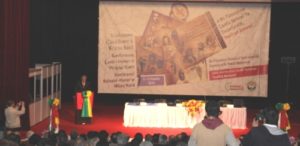
One of the underlying themes in the panel on the ancient history of the land and its culture was the originality of Kurdistan geography and its autochthonous people. The Kurdish contribution to the Neolithic era was acknowledged, particularly the distinct role of women in the evolution of communal life, language, and culture. It was stated that archeologists have established based on their findings in Kurdistan that Mesopotamia has long been a haven for human life and one of the loci of human civilization in the beginning of sedentary life, agriculture, and invention of tools, a history traceable to 8000 years B.C.E.an evolutionary process that originated in what is now the Kurdish ancestral land and then spread to other parts. Kurds were defined as creators of culture, institutions, animal domestication, and agriculture. Ahmet Yildrim referred to the Diyarbakir basin and Hasankeyf as key sites for many civilizations. It was argued that the ancestors of Kurds have made tremendous contributions to the material conditions for the emergence of civil structures and that Middle Eastern people should be indebted to the Kurds for their preservation of and respect for nature. The panelists bemoaned the fact that Kurds are now suffering and derided by forces of tyranny and subjected to “two hundred years of genocide and assimilation”.
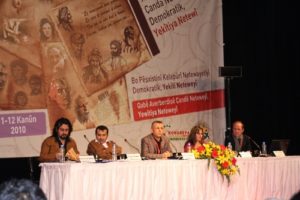
The panels on culture and literature discussed the development processes, the problems that the Kurdish literature confronts along with the Kurdish language itself. A broad concern was how to develop Kurdish literature and art in the absence of the most fundamental rights, literacy, and channels of communication and dissemination of literature in the face of restrictions, linguistic, political and cultural divisions that Kurds are grappling with. Hashem Ahamadzadeh spoke about the relation between language and political power, the modern legacies and historiography of state making, dialectal variations and conditions of repression as impediments to communication among Kurdish literates. Abas Wali focused on the interdependency of literacy and socio-political processes and the role of intelligentsia in defining culture. A considerable amount of time was devoted to delineating the roles and responsibilities of the intellectuals and artists. Jalile Jalil, a Kurdologist and historian observed “ Our language is wounded; we have yet to understand the richness of our language… that terminological and literary niceties are all great, but how can literature grow if Kurdish children can not read what we write? We do not understand the language of our Denbejs (traditional Kurdish singers or bards) our neighbors.” Film makers, actors, and playwrights stressed the need for exploring and producing films and plays on local and universal themes; however, As Shirin Jihani, the first Kurdish woman film director pointed out, in the absence of such a culture and independent institutions, film makers face major difficulties in producing, presenting, and promoting their work.
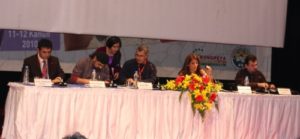
The panelists in discussing the state of Kurdish music, argued that despite customary celebration of music in Kurdish daily, ethnic, social and political life and its lofty and sacred position, particularly in religious practices and cultural rituals and the distinct place of musicians and vocalists in Kurdish culture, we do not really know what an original and varied treasure we have. They stressed the need for ethno musicological research to identify different types of genres, compositions and their aesthetic modes in different areas, particularly those rich in musical traditions such as Hakkari… It was pointed out that our musical tradition has been threatened and now is lending itself to imitation. Mikail Aslan, composer, musician, and vocalist spoke about the deplorable condition in which Zaza speakers and their music once lived and how they had become alienated and removed from themselves once the language was colonized and conquered. “If one is separated from language, one loses himself or herself. This is how our music was seized’ then they humiliated us by saying that this is the language of peasants; many lost their psychological balance by subjecting themselves to self-censorship. He argued that the youth fall prey to this ideology easily and we have to fight against this ruthless assimilation.
The importance of language standardization on the basis of the common features of the different dialects was discussed. At the end a flexible linguistic identity inclusive of all dialects was what many panelists and members of the audience called for instead of a fixed, homogeneous linguistic identity.
It was noted that although Kurds face similar problems in neighboring countries, the Kurds in Turkey have faced frightening discrimination, a belligerent nationalism and a ruthless repression of their language and identity. Some of the presenters highlighted the dogmatic and assimilationist ideology that has penetrated the very fabric of the Turkish society and the media. It was pointed out that despite some positive developments; the Turkish media continues to portray Kurds in a negative light as an affront to Kurdish ideals. The presenters stressed the need for debunking these misguided and dangerous images by reclaiming the rich and colorful life and traditions of the Kurdish people through creating and expanding Kurdish media for self-representations.
The Kurdish intellectuals were called upon to be ready to take up new and dynamic challenges to reexamine and adapt to their conceptions of their identities. They were urged to develop new paradigms which would illuminate their political and social responsibilities towards freedom, peace and justice. “to stop cultural genocide and recreate ourselves” Kurdish women were described as the main bearers of the struggle of Kurdishness.”
We should register our regret at the absence of the term language in the very title of this conference, on which depends the very foundation and existence of the other categories that the conference discussed. Needless to say that relentless repression of the Kurdish language in Turkey would have merited special attention, particularly in a country that to this day, the public use of the language in what it has been termed a liberal milieu is still frowned upon and its educational use as a mother tongue continues to be forbidden. Although the conference was attended by several prominent novelists, writers and poets, issues of language and ideology, and language discrimination could have been constructively and effectively discussed by linguists and anthropologists; there were many occasions that linguists could have made informative contributions to the discussions. Although Dillan Roshani, was given a few minutes to present a proposal for unifying the various dialects, linguistics, not to be confused with general notions of language, was peripheral to the conference.
Likewise, although all the experts in attendance made a tremendous contribution to the conference, the relative absence of anthropological and sociological expertise may have left some unanswered questions. Experts in these fields would have been able to provide both theoretical and methodological insights and outlooks into the broad sociocultural and linguistic issues by presenting their research and identifying and setting goals for new research in anthropological and sociological investigations.
One issue that received the wide presence of the Turkish media was the signing of a resolution by Ahmed Turk and DTP representatives. The resolution stressed the importance of the peace process and the need to put an end to repression and urged the Turkish government to recognize the sociocultural and political rights of the Kurdish people with particular emphasis on the right to education in the mother tongue.
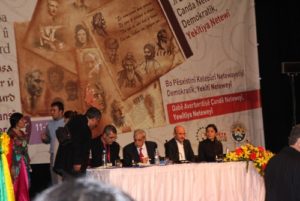
One of the highlights of the conference was a tribute paid to Aram Tigran, the famous Armenian singer, musician, and composer, who has created a vast and varied musical repertoire in Kurdish, thus contributing to the preservation of musical and oral traditions of Kurds. His wife related the passion Aram had for singing in Kurdish and celebrating Kurdishness to the last moment of his life.
The conference ended with a resolution formulated by a working committee and endorsed by the attendees. It was agreed that the working committee would plan the second conference to be held next year in Hawler (Erbil). The overall proceedings can be summarized as follows: increasing pressure on the Turkish government to allow public education in Kurdish, creating the contexts for and increasing dialogue among different Kurdish intellectuals and artists, pursuing the objectives of the conference persistently, working on overcoming the challenges of reclaiming and reconstructing Kurdish cultural heritage, resources, and past, recognizing diversity among Kurdish communities as a historical and political reality ,working on the challenges of connecting with the general public, setting objectives and pathways relevant to future conferences. The working committee will be publishing the proceedings and the presentations. A cursory search of the main stream media both Turkish and Western media shows fragmentary and sporadic coverage of the conference. Perhaps the conference organizers should launch the official website of the conference as soon as possible to post the conference proceedings and start blogging and tweeting to communicate the ideas discussed in the conference to other Kurdish intellectuals, artists, and the general public. This conference’s best practices in general and more specifically the contributions of the Kurdish intellectuals and artists to cultural preservation and promotion of Kurdish cultural values that embrace democracy and diversity, could serve as a platform for other Kurdish communities to exchange, debate and share their experiences, proposals, practices and processes for the development of Kurdish national aspirations.
The conference culminated in a dinner reception where the mayor of Diyarbakir, Osman Baydemir, once again highlighted the significance of the conference in the resurgence of Kurdish identity and the quest for fundamental rights and freedoms; he thanked the participants for contributing to one of the greatest events in the contemporary history of Kurds. Then an array of famous and popular musicians, vocalists, and composers from different parts of Kurdistan performed multiple pieces of authentic Kurdish music in different genres such as dengbeji, loosely, bards’ tradition, stranbeji, minstrels , heyrans, and love songs as the audience sang and danced along to the accompaniment of musical instruments all night.
